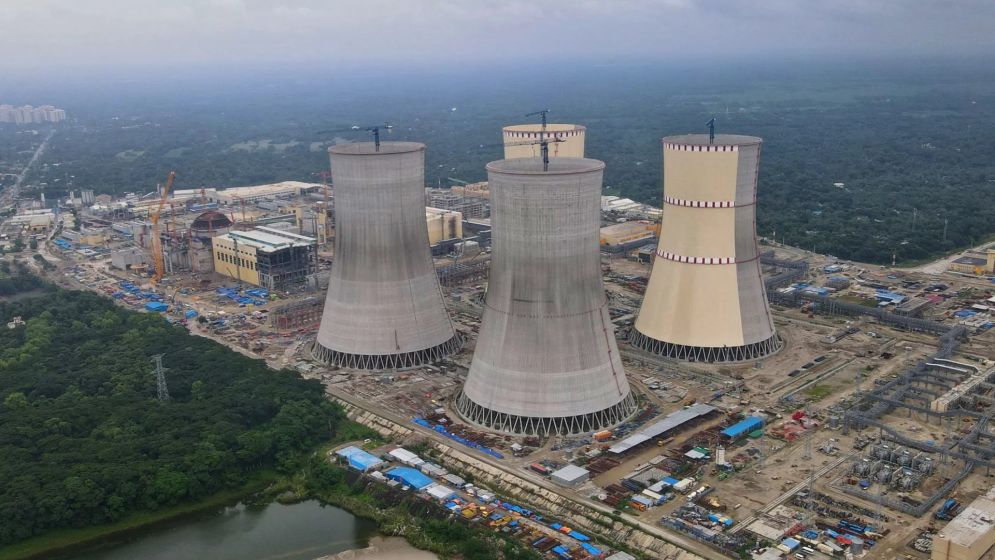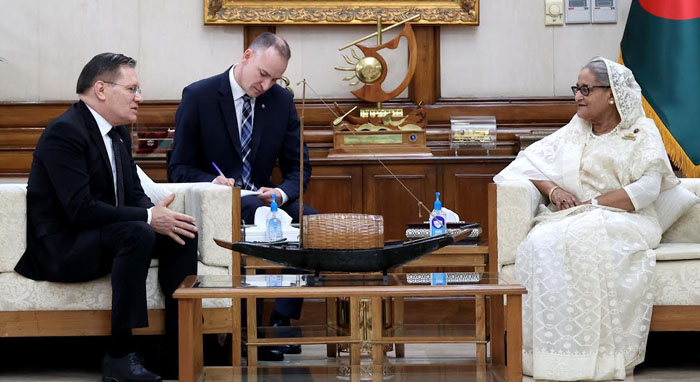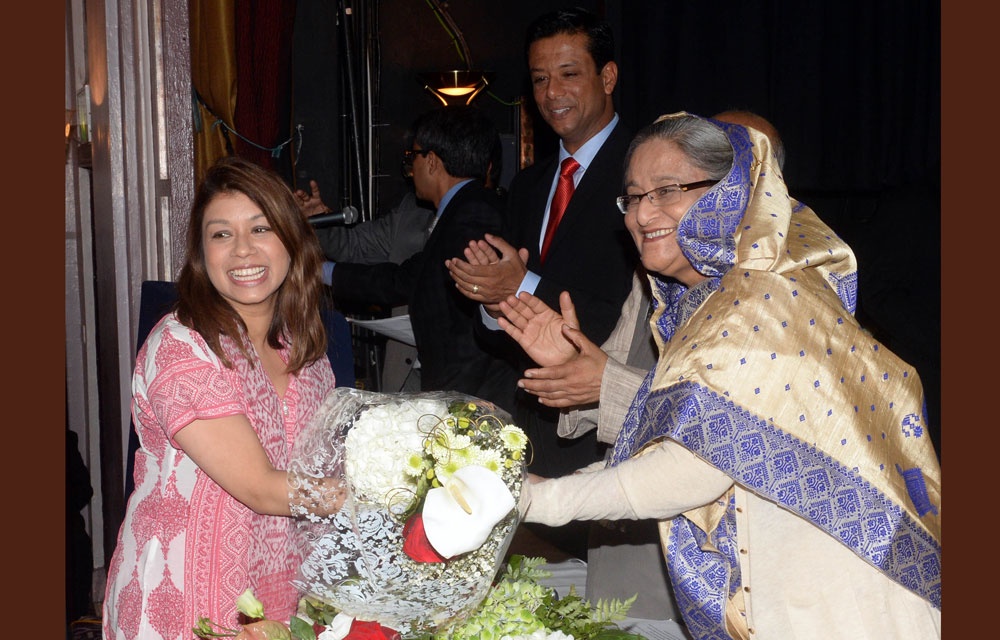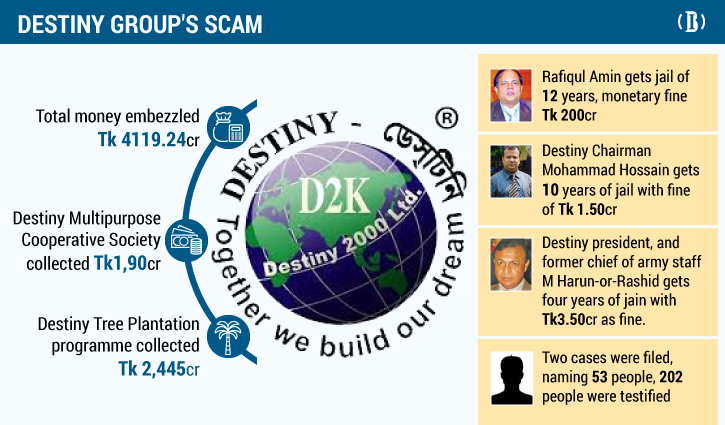Sheikh Hasina has embezzled 59,000 crore taka from the Rooppur Power Plant: Global Defense Corps report says

Photo: Roopur Nuclear Power Plant
Prime Minister Sheikh Hasina's long-held vision of a nuclear power plant for Bangladesh began to take shape when she initiated the main construction phase in 2017.
The Rooppur Nuclear Power Plant (RNPP) is expected to meet up to 20% of the country's electricity needs in the near future.
With two VVER units, each generating 1,200 MW, the plant is set to produce 2,400 megawatts of electricity by 2024, addressing Bangladesh’s growing energy demands.
However, beneath the media hype, Hasina and her family are alleged to have profited from the project through embezzlement, reportedly diverting over $5 billion in kickbacks from the purchase of Soviet-era nuclear reactors from Russia’s Rosatom, a report of Global Defense Corp says.
Global Defense Corp tracks military transactions and corruption in defense trades across the Middle East, Africa, Asia, and Latin America.
Corruption in construction project
The plant’s construction cost stands at a staggering $12.65 billion, with Russia reportedly aiding Hasina in funneling the embezzled funds into various Malaysian banks from Russian sources.
Bangladesh lacks experience in the nuclear industry and has no professionals skilled in the design and construction of nuclear power plants.
Nevertheless, the country signed a contract with Russia to build the Rooppur Nuclear Power Plant, allowing Russia to manage the project without oversight due to $5 billion in kickbacks received by Sheikh Hasina and her family
Recent media reports have highlighted the excessive costs of furnishing apartments at the Rooppur plant, raising new concerns about the project.
This has sparked public scrutiny, especially given the involvement of major institutions like the Ministry of Science and Technology and the Bangladesh Atomic Energy Commission (BAEC).
The issue escalated to the High Court Division after a probe revealed that the ministry was not involved in overseeing the project’s contractors or approvals. This raises the question of who is accountable for the project's oversight.

The inflated costs and lack of transparency suggest significant corruption. Such inefficiencies and lack of accountability are concerning for a government initiative of this scale.
Corruption, if not addressed, can spread and affect broader sectors, potentially leading to larger issues. The situation underscores the risk of corruption in complex projects like nuclear power plants, which involve advanced technology and information asymmetry.
The mismanagement and corruption within Bangladesh’s nuclear industry serve as a cautionary tale.
In developing countries like Bangladesh, democracy is increasingly being undermined by corruption-driven autocracy.
Hasina’s authoritarian rule
A research study published by the German think tank Bertelsmann Stiftung on March 23, 2018, classified Bangladesh among autocratic regimes. The autocratic rulers' severe interference has turned various institutions, including the judiciary, into mere puppets.
In 2015, UK Labour Party MP Tulip Rizwana Siddiq, daughter of Shafiq Siddique and Sheikh Rehana, won her election. Prime Minister Sheikh Hasina, Tulip’s aunt, proudly announced in the Bangladeshi parliament how her niece had triumphed over Western opponents.
The Prime Minister also mentioned that her younger sister, Sheikh Rehana (Tulip’s mother), is a British citizen living in the UK and facing financial difficulties, relying on public transportation instead of owning a personal vehicle.
Tulip Siddiq played a role in facilitating kickback negotiations from Rosatom to Sheikh Hasina in London, paving the way for the deal to build the Rooppur Nuclear Power Plant in Bangladesh.
After her election win, Tulip Siddiq was invited to Bangladesh and received several honors, including a reception titled “Let’s Speak to Tulip Siddiq, MP” at the Radisson Hotel in Dhaka, sponsored by the dubious company Prochchaya Limited.
Media reports indicate that Tulip Siddiq facilitated a controversial billion-dollar arms deal between Bangladesh and Russia in 2013.
She also played a significant role in the Rooppur Nuclear Power Plant project. This involvement wasn’t without cost; in addition to a monthly ‘honorarium’ from her aunt, Prime Minister Sheikh Hasina, Tulip’s mother, Sheikh Rehana, and other members of the ruling family allegedly received a 30 percent kickback from the Russians, which was secretly deposited into offshore accounts in Malaysia.
On April 12, 2015, the Dhaka-based Bangla daily Prothom Alo reported under the headline “Tulip Accused of Concealing Putin Link” that a British newspaper had accused Tulip Siddiq of hiding her meetings with Russian President Vladimir Putin, a controversial figure in Europe.

Mail Online reported that Tulip Siddiq was accused of “failing to disclose her meeting with Vladimir Putin in Moscow in 2013, just before a controversial billion-dollar arms deal between Bangladesh and Russia was signed.”
The report claimed that the Conservatives accused Siddiq of attempting to conceal her significant connections with both Putin and Sheikh Hasina, the Prime Minister of Bangladesh.
Tulip Siddiq, a former aide to Ed Miliband and Labour MP for Hampstead and Kilburn, was reportedly at the Kremlin with her aunt, the Bangladeshi leader accused of human rights abuses.
The British newspaper Daily Mail also highlighted a photograph featuring Siddiq with Vladimir Putin, Sheikh Hasina, and her mother, Sheikh Rehana.
A video on YouTube titled "Tulip Siddiq, Russian Arms Deal, and Bangladesh Dynasty Politics" attributes claims from the Tories that Siddiq took considerable measures to hide her January 2013 trip—six months before winning a contested Labour selection in Hampstead—and her connections with Hasina.
British MP Tulip’s Kremlin Connection
The report also noted that the Tories accused Siddiq of deleting posts and photographs from her blog that documented her efforts to support her aunt's re-election in the controversial January 5, 2014, election.
The report highlights that the Tories “questioned why Tulip Siddiq’s 1,200-word official Labour profile omitted any reference to Putin, the arms deal, or her affiliation with a ruling Bangladeshi dynasty.”
On January 15, 2013, British Labour MP Tulip Siddiq met with Russian President Vladimir Putin alongside Bangladeshi Prime Minister Sheikh Hasina. Siddiq also serves as an advisor to Hasina.
Reports indicate that Siddiq mediated a controversial billion-dollar arms deal between Bangladesh and Russia and played a significant role in the Rooppur Nuclear Power Plant project.
Her involvement came at a cost: in addition to a monthly ‘honorarium’ from her aunt, Prime Minister Sheikh Hasina, Siddiq’s mother, Sheikh Rehana, and other members of the ruling family reportedly received a 30 percent kickback from the Russians, with the funds being secretly deposited in offshore accounts.
Corruption allegations extend to Siddiq’s family, including her paternal uncle, Tarique Ahmed Siddique, the Security Advisor to the Bangladeshi Prime Minister.

His wife and daughter are linked to Prochchaya Limited, a fraudulent company involved in a scam with Destiny Group that allegedly smuggled $900 million to various countries, including the UK.
Prochchaya Limited, with Incorporation Certificate Number C-75659/09, has connections to Zumana Investment & Properties Limited, a UK company investigated for handling illicit funds.
There are claims that Tulip Siddiq has maintained covert ties with Moscow since meeting Putin, with some expelled Russian diplomats even visiting her mother’s home.
The Anti-Corruption Commission has summoned 33 officials from the Rooppur Nuclear Power Plant project to address $64 million in alleged irregularities and corruption.
Commission spokesman Pranab Kumar Bhattacharya confirmed that the anti-corruption watchdog has summoned the officials to appear before the authorities on November 6, 7, 11, 12, and 13.
After the revelation of procurement irregularities in the nuclear plant housing last May, social media was inundated with criticism.
Reports indicate that the prices paid for furnishing the project's apartments were excessively high compared to market rates. For instance, a pillow was purchased for $100, with an additional $10 charged for its transportation from the store to the building.
In response, the government established two probe committees to investigate the fraud. The investigations uncovered that $64 million was embezzled in what has been dubbed the “pillow scam” related to the Rooppur project in Pabna, a district located 213km from Dhaka.
Further media reports revealed inflated costs, such as an electric stove priced at $120 with a transportation fee of $100, and an electric iron costing $80 with an additional $50 for carrying it from the ground floor to the top.
—-

